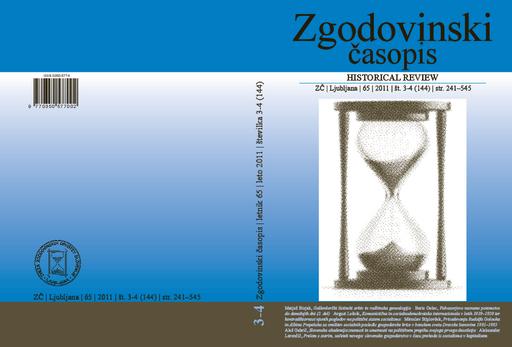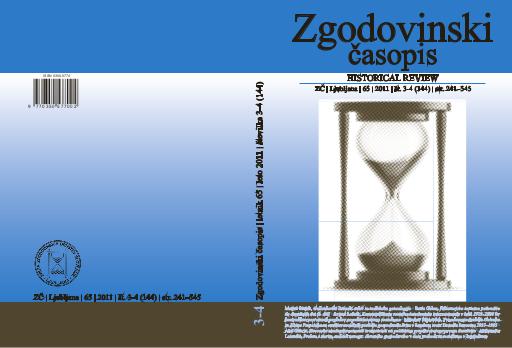/
Serijske publikacije
/
Zgodovinski časopis
Prizadevanja Rudolfa Golouha in Albina Prepeluha za omilitev socialnih posledic gospodarske krize v banskem svetu Dravske banovine 1931–1935

Avtor(ji):Miroslav Stiplovšek
Soavtor(ji):Peter Štih (odg. ur.), Dušan Mlacović (ur.), Bojan Balkovec (teh. ur.), ives Sulič Dular (prev.), Niko Hudelja (prev.)
Leto:2011
Založnik(i):Zveza zgodovinskih društev Slovenije, Ljubljana
Jezik(i):slovenščina
Vrst(e) gradiva:besedilo
Datoteke (1)

Ime:ZC_2011_3-4.pdf
Velikost:3.88MB
Format:application/pdf
Stalna povezava:https://hdl.handle.net/11686/file18353
Opis
Rudolf Golouh in Albin Prepeluh, nekdanja
pripadnika Jugoslovanske socialnodemokratske
stranke, sta imela v banskem svetu Dravske
banovine pomembno vlogo kot dobra poznavalca
socialne problematike, ki se je v času
gospodarske krize skrajno zaostrila. V številnih
razpravah sta si prizadevala za izboljšanje
položaja delavstva in revnejšega kmečkega
prebivalstva. Pomemben uspeh njunega delovanja
za izboljšanje socialnega skrbstva je bilo
oblikovanje bednostnega sklada, zlasti za pomoč
brezposelnim. Bila sta edina banska svetnika,
ki se nista vključila v režimsko stranko, zato
so bila tehtna njuna kritična politična stališča
do vladne politike za reševanje posledic gospodarske
krize, posebej v Sloveniji. Bila sta
med najdejavnejšimi banskimi svetniki v prvi
polovici tridesetih let.
Metapodatki (11)
- identifikatorhttps://hdl.handle.net/11686/35030
- naslov
- Prizadevanja Rudolfa Golouha in Albina Prepeluha za omilitev socialnih posledic gospodarske krize v banskem svetu Dravske banovine 1931–1935
- Social Work of Rudolf Golouh and Albin Prepeluh in the Provincial Council of the Drava Province between 1931 and 1935
- ustvarjalec
- Miroslav Stiplovšek
- soavtor
- Peter Štih (odg. ur.)
- Dušan Mlacović (ur.)
- Bojan Balkovec (teh. ur.)
- ives Sulič Dular (prev.)
- Niko Hudelja (prev.)
- predmet
- Dravska banovina
- banski svet
- Rudolf Golouh
- Albin Prepeluh
- gospodarska kriza
- socialno skrbstvo
- Drava Province
- Provincial Council
- Rudolf Golouh
- Albin Prepeluh
- economic crisis
- social care
- opis
- Rudolf Golouh in Albin Prepeluh, nekdanja pripadnika Jugoslovanske socialnodemokratske stranke, sta imela v banskem svetu Dravske banovine pomembno vlogo kot dobra poznavalca socialne problematike, ki se je v času gospodarske krize skrajno zaostrila. V številnih razpravah sta si prizadevala za izboljšanje položaja delavstva in revnejšega kmečkega prebivalstva. Pomemben uspeh njunega delovanja za izboljšanje socialnega skrbstva je bilo oblikovanje bednostnega sklada, zlasti za pomoč brezposelnim. Bila sta edina banska svetnika, ki se nista vključila v režimsko stranko, zato so bila tehtna njuna kritična politična stališča do vladne politike za reševanje posledic gospodarske krize, posebej v Sloveniji. Bila sta med najdejavnejšimi banskimi svetniki v prvi polovici tridesetih let.
- Formerly members of the Yugoslav Social Democratic Party and authorities on social issues, Rudolf Golouh and Albin Prepeluh played a significant role in the Provincial Council of the Drava Province during the period of aggravated social conditions of the economic crisis. Participating in numerous Council discussions, they fought for better living conditions and social welfare for the working classes and for the more impoverished segments of the rural population. One of the most significant results of their endeavors was the establishment of a poverty fund whose principal task was to help the unemployed. Golouh and Prepeluh were the only councilors who were not members of the ruling party, and their critical political views on government policy on coping with the consequences of the economic depression were extremely weighty, particularly in Slovenia. They were among the most active councilors of the Drava Province during the first half of the 1930s.
- In the 1930s, the Provincial Council of the Drava Province was the only representative body with advisory capacity that was able to influence the development of Slovene economy, social welfare, education, and culture. The 1929 Provincial Administration Act and the 1930 Organization and Operations of Provincial Councils Regulation stipulated that the primary task of Provincial councilors was to advise the Provincial Governor on planning the Provincial budget for the implementation of activities in agriculture, trade, commerce and industry, public works, health care and social policy, education, culture, and physical education. While the Governor, who administered the operations of the Provincial Council, could approve or reject suggestions of councilors according to his own judgment the Minister of Finance had the right to the final adoption of the budget of the Province. Each district had the right to its own representative in the Provincial Council; the Council’s competences, however, were quite restricted. Depending upon their size, cities with over 3,000 inhabitants had the right to up to four representatives. Minister of the Interior had the right to choose Provincial councilors among those with adequate professional qualifications who, in their advisory capacity, would be most beneficial to the interests of the Province. In view of this competence of the Minister, the composition of the Provincial Council had the same regime character as the central government. In this respect, Rudolf Golouh and Albin Prepeluh were the only exceptions among the forty representatives in the Provincial Council of the Drava Province. Both Golouh, a representative of the town of Maribor, and Prepeluh, who represented the town of Ljubljana, started their political careers in the Social Democratic party. At the time of his appointment to the Provincial Council, Golouh worked as Head of the Employment Service of Maribor; prior to the prohibition of political parties he was an officer of the Socialist Party for Slovenia. In addition to being an established author of articles on working-class and farmers’ issues, Prepeluh was one of the leaders of the movement for autonomous Slovenia. They were furthermore the only Provincial councilors who did not join the Yugoslav National Party, which at the time was the leading political party. Due to their political impartiality and excellent knowledge of social issues they played a special and significant role in the Council throughout their mandate until 1934. In January 1931, when the Provincial Council resumed its activities, this coincided with the beginning of a severe economic crisis. Its consequences were particularly harsh in workingclass centers and among the farming population. Whenever they were discussing the budget of the Province in the first half of the 1930s, councilors repeatedly had to pay particular attention to urgent social and economic issues; Golouh and Prepeluh were among the most ardent participants in these discussions. At Council meetings they informed their colleagues of the overall characteristics of the economic crisis in Slovenia and proposed numerous measures, particularly those that could arrest increasing unemployment and provide help for the most underprivileged. Since in that critical period budgetary resources for social assistance did not suffice Golouh proposed the creation of a poverty fund that would be financed by a constant influx of tax money. Even though the Minister of Finance did not authorize its budget proposal in full the Poverty Fund became an important addition to budgetary resources for social projects. Golouh and Prepeluh managed to ensure that the 21,000,000 dinars, accumulated in the Poverty Fund during the 1933- 1936 period, were expediently spent primarily on finding employment for workers and destitute farmers, on soup kitchens, and on other ways of helping the underprivileged. Their discussions in the Provincial Council largely addressed the problem of distribution of budget sources for social policy and health care. In addition, they repeatedly emphasized these burning issues when budgetary expenditure in other fields was being discussed. In order to improve conditions in agriculture both councilors advocated consistent implementation of land reform and reinforcement of the system of cooperatives. They proposed increased funding for professional schooling of children from poor families of artisans and merchants. They advocated public work programs, particularly in areas with the highest unemployment rate, and suggested measures that would alleviate unemployment of teachers. They also firmly championed a graduated income tax and tax relief for the underprivileged. Harshly criticizing inadequate government economic and social policy on solving the economic crisis, Golouh and Prepeluh particularly emphasized government’s financial negligence of Slovenia. They were staunch proponents of increased Provincial powers. They also upheld election of the Provincial Council as had been stipulated by the second Yugoslav Constitution of 1931. Anxious about potentially reduced political power, no government wanted to enforce such decentralization of power. Since in the period of the economic crisis the Minister of Finance reduced all Provincial budgets suggested by the Provincial Governor and the Council, which significantly reduced the means to successfully solve a number of urgent problems in Slovenia, Golouh and Prepeluh constantly stressed that only elected self-managing administrative bodies of the Province could successfully enforce their budgetary claims. Holding approximately 120 discourses in the course of forty meetings of the Provincial Council in the 1931-1935 period, Golouh and Prepeluh were among the most diligent councilors. Yet there were still numerous initiatives and proposals for solving social, economic, educational, and cultural issues that they were unfortunately unable to implement due to modest competence and insufficient financial resources.
- založnik
- Zveza zgodovinskih društev Slovenije
- datum
- 2011
- tip
- besedilo
- jezik
- Slovenščina
- jeDelOd
